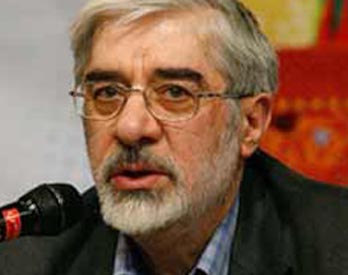Presidential challenger criticizes Ahmadinejad's economic programmes
 Tehran - Iranian presidential candidate and former prime minister Mir-Hossein Moussavi on Saturday criticized the economic programmes of President Mahmoud Ahmadinejad and blamed him for not considering the hard times when the oil price was high.
Tehran - Iranian presidential candidate and former prime minister Mir-Hossein Moussavi on Saturday criticized the economic programmes of President Mahmoud Ahmadinejad and blamed him for not considering the hard times when the oil price was high.
"When we had a lot of foreign currency income (through oil exports), we did not plan anything for the (current) recession phase," said Moussavi in his first campaign speech in a mosque in the southern Tehran district Nazi Abad.
Iran enjoyed an economic boom with oil prices around 150 dollars per barrel early last year. Oil prices have since fallen by more than two thirds.
Moussavi said that Ahmadinejad has failed, even during the period of high oil prices, to implement his economic reforms and fulfil his promises to increase the living standard of the middle- and lower- classes, who were his main supporters in 2005.
Inflation officially rose to 30 per cent - unofficially and especially in real estate even higher - harming not only those with lower incomes.
The 68-year-old Moussavi, who declared his candidacy on Tuesday, is considered a moderate technocrat and economic expert.
Unlike the two other moderate candidates, Mehdi Karroubi and Mohammad Khatami, Moussavi is expected to focus more on the economy, which is currently a top issue for Iranian voters, compared to other domestic or foreign policy issues.
"Nobody listened to economic and political experts who had warned that there would be ups and downs in politics," Moussavi told hundreds of his supporters, who welcomed him with "Mir-Hossein is a hero and supporter of the poor."
Moussavi referred to one of the biggest embarrassments of the Ahmadinejad era, which was the presentation of a faked Oxford University honorary doctorate by Interior Minister Ali Kordan. The minister was dismissed in November by Parliament.
"There were times (in the Islamic revolution) when there was no need to go up the ladder of power with buying university certificates," Moussavi said.
Moussavi, born in 1941 in Khameneh, north-western Iran, was prime minister from 1981-89, during the Iran-Iraq war (1980-88).
In 1989, the prime minister portfolio was scrapped from the Iranian constitution, and the president became the head of the executive branch and Iran's number two, after the supreme leadership, currently held by Ayatollah Ali Khamenei.
Since then, Moussavi withdrew from the political scene, acting only as an advisor to former president Mohammad Khatami from 1997- 2005.
He has served as member of Expediency Council, an arbitration body in charge of intervening in legislative disputes, but neither post had political significance.
Moussavi was initially supposed to act as Khatami's vice-president in case of an election victory, but for unknown reasons, he decided to run directly in the election.
The presence of three candidates with similar platforms is considered by observers to have the potential to split the moderate vote, to the advantage of Ahmadinejad, whose ultra-conservative faction has name him as its sole candidate.
From the moderate conservative faction, Tehran Mayor Mohammad Bagher Ghalibaf is expected to announce his candidacy.
Observers believe that turnout will decide the election.
A high turnout could increase the chances of the opposition candidates and especially Khatami, while low voter participation would likely help Ahmadinejad to a second term. (dpa)